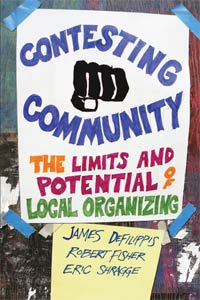Contesting Community takes an insightful and important look at problems with the use of the term “community,” and how to reclaim it for progressive social change, though it misses a chance to promote coalition work that is already taking the approach the authors advocate.
Thirty-five years ago, Raymond Williams, the English critic and author, offered an insightful definition of “community.” In addition to community as a group of people, a specific geographic place, or a set of shared interests, he suggests, “Community can be a warmly persuasive word to describe an existing set of relationships, or the warmly persuasive word to describe an alternative set of relationships. What is most important, perhaps, is that unlike all other terms of social organization it seems never to be used unfavourably.”
How true this is. After all, how many of us refer to our political opposition as “community”? Certainly, in my own organizing, tenants and workers have always been “the community.” But the Building Industry Association or Chamber of Commerce? They were connivers, cabals, or even crooks.
In Contesting Community: The Limits and Potential of Local Organizing, James DeFilippis, Robert Fisher, and Eric Shragge extend Williams’s insight by exploring the use of “community” as an ideological frame offered by the right (and to some extent embraced by the center left) as an antidote to the near abandonment of the welfare state and the massive transfer of wealth from the economic bottom to the economic top, a decades-long transfer that has left us with an income gap rivaling 1929 and a social fabric in shreds. The authors show how “community” and its favorable implications has been romanticized as the place where those left out of this transition are supposed to find both solace and the tools to redress the damage. However, since this huge economic shift has drastically reduced much of the resources once available in local communities, the assumption that these same communities hold within themselves everything they need to flourish defies common sense — a major case of deflecting blame.
The book does not suggest that community as a place of support and resource generator is always disingenuous. Quite the contrary; “community” has been a call to action by those who have stood their ground and resisted this wealth transfer — through both “community” organizing and “community” development. Community is a rallying cry for unity among those without power to be used against those with it and a form of identity that bonds people at the most local of levels. What the authors do ask of us, however, is that when we call upon our community as a force for social change, we understand how that claim is also used as cover for the absence of social regulation and public intervention.
One of the important points of this short book is that in order to use the idea of “community” in a solid progressive manner, it is vital that community organizers and developers locate and name the problem that they are addressing — but not only at the community level. We live in neoliberal capitalism, where the private market rules. The authors argue that we could fight better at the local level if we also acknowledge the broader — systemic — barriers to the redistribution we wish to see.
Naming the problem and acknowledging context requires two things. The first is recognizing that community is where we start but not where we finish. The second is we cannot build communities that demand redistribution without an acceptance of conflict. Redistribution is a discredited concept in this nation’s present conversation about the future. Indeed, during the vice-presidential debate between Joe Biden and Sarah Palin in 2008, Biden at one point had to argue that the Obama campaign was about “fairness, not redistribution.” Actively changing this message requires a willingness to engage in open disagreement and struggle.





Comments